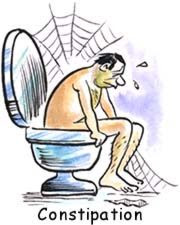
- Generally medical books says CONSTIPATION IS THE FATHER OF DISEASE
- It is true chronic constipation may leads to digestive problems, gas problems, and mental worries,
- Constipation is defined as having a bowel movement fewer than three times per week.
- With constipation stools are usually hard, dry, small in size, and difficult to eliminate.
- Some people who are constipated find it painful to have a bowel movement and often experience straining, bloating, and the sensation of a full bowel.
- Constipation is a symptom, not a disease. Almost everyone experiences constipation at some point in their life, and a poor diet typically is the cause.
- Most constipation is temporary and not serious.
- Understanding its causes, prevention, and treatment will help most people find relief.
To understand constipation, it helps to know how the colon, or large intestine, works. As food moves through the colon, the colon absorbs water from the food while it forms waste products, or stool. Muscle contractions in the colon then push the stool toward the rectum. By the time stool reaches the rectum it is solid, because most of the water has been absorbed.
Constipation occurs when the colon absorbs too much water or if the colon’s muscle contractions are slow or sluggish, causing the stool to move through the colon too slowly. As a result, stools can become hard and dry.

- Not enough fibre in the diet
- lack of physical activity (especially in the elderly)
- Medications( pain medications especially narcotics, antacids that contain aluminum and calcium, blood pressure medications, antispasmodics, antidepressants
- Iron supplements, diuretics, anticonvulsants)
- Milk(over drinking)
- Irritable bowel syndrome
- Changes in life or routine such as pregnancy, aging, and travel
- Abuse of laxatives
- Ignoring the urge to have a bowel movement
- Dehydration
- Specific diseases or conditions, such as stroke (most common)
- Problems with the colon and rectum
- Problems with intestinal function (chronic idiopathic constipation)
The doctor may ask a patient to describe his or her constipation, including duration of symptoms, frequency of bowel movements, and consistency of stools, presence of blood in the stool, and toilet habits— how often and where one has bowel movements. A record of eating habits, medication, and level of physical activity will also help the doctor determine the cause of constipation.
The clinical definition of constipation is having any two of the following symptoms for at least 12 weeks—not always consecutive—in the previous 12 months:
- Straining during bowel movements
- Lumpy or hard stool
- Sensation of incomplete evacuation
- Sensation of anorectal blockage/obstruction
- Fewer than three bowel movements per week
Sometimes constipation can lead to complications. These complications include haemorrhoids, caused by straining to have a bowel movement, or anal fissures—tears in the skin around the anus—caused when hard stool stretches the sphincter muscle. As a result, rectal bleeding may occur, appearing as bright red streaks on the surface of the stool. Treatment for haemorrhoids may include warm tub baths, ice packs, and application of a special cream to the affected area. Treatment for anal fissures may include stretching the sphincter muscle or surgically removing the tissue or skin in the affected area.
Sometimes straining causes a small amount of intestinal lining to push out from the anal opening. This condition, known as rectal prolapse, may lead to secretion of mucus from the anus. Usually eliminating the cause of the prolapse, such as straining or coughing, is the only treatment necessary. Severe or chronic prolapse requires surgery to strengthen and tighten the anal sphincter muscle or to repair the prolapsed lining.
Constipation may also cause hard stool to pack the intestine and rectum so tightly that the normal pushing action of the colon is not enough to expel the stool. This condition, called fecal impaction, occurs most often in children and older adults. An impaction can be softened with mineral oil taken by mouth and by an enema. After softening the impaction, the doctor may break up and remove part of the hardened stool by inserting one or two fingers into the anus.
Points to Remember
- Constipation affects almost everyone at one time or another.
- Many people think they are constipated when, in fact, their bowel movements are regular.
- The most common causes of constipation are poor diet and lack of exercise.
- Other causes of constipation include medications, irritable bowel syndrome, abuse of laxatives, and specific diseases.
- A medical history and physical exam may be the only diagnostic tests needed before the doctor suggests treatment.
- Whenever a significant or prolonged change in bowel habits occurs, check with a doctor.
Treatment
Mind the phrase CONSTIPATION IS THE FATHER OF DISEASE, in allopathic method of treatment they will prescribe laxatives for constipation, continues intake of laxatives produce more constipation and it will dry out the digestive tract. In Homoeopathic method of treatment we will find out the cause of constipation and we gave the medicine according to the cause, it is more effective with out side effect
For treatment
Please click
http://treatmentt.blogspot.com/2009/11/constipation-treatment.html
Direct Consultation
Please Visit
Dr.D.Senthil Kumar, B.H.M.S., M.D (Alt Med)., M.Phil(Psy)
Consulting Homoeopath & Psychologist
Vivekanantha Homeopathy Clinic
Chennai: +91 9786901830
Pondicherry (Puducherry): +91 9443054168
Panruti: +91 9786901830
Mail: consult.ur.dr@gmail.com, homoeokumar@gmail.com